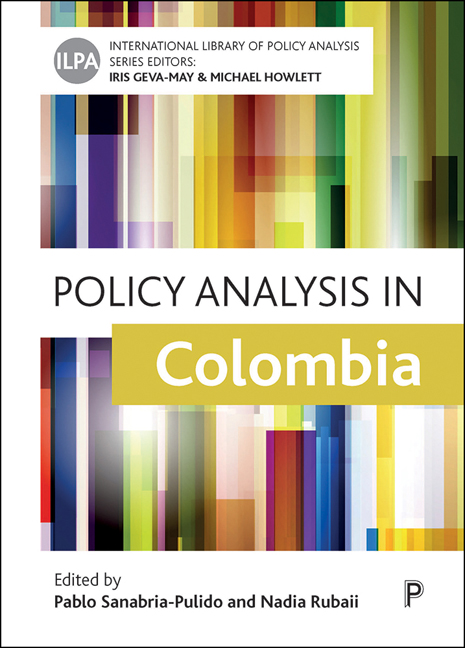Book contents
- Frontmatter
- Dedication
- Contents
- List of Figures and Tables
- List of Abbreviations
- Notes on Contributors
- Editors’ Introduction to the Series
- Policy Analysis in Colombia: An Introduction
- Part One Policy Analysis in Contemporary Colombia
- One The policy Analysis Movement in Colombia: The State of the Art
- Two Evolution of Policy Analysis as a Field of Study and Instruction in Colombia
- Three Policy Analysis, Bureaucratic Capacity and Public Administration Reforms in Colombia
- Part Two Policy Analysis within National and Subnational Governments
- Four Policy Analysis Inside Central Government in Colombia
- Five Policy Analysis and the Legislature in Colombia
- Six Policy Analysis in the Colombian Constitutional Court
- Seven Metropolitan Governance and Policy Analysis in Colombia
- Eight Policy Analysis for Decision Making in Colombian Local Governments
- Part Three Policy Analysis in Key Policy Domains
- Nine Policy Analysis in the Education Sector in Colombia
- Ten Policy Analysis in the Health Sector in Colombia
- Eleven Policy Analysis and Decision Making in the Military Forces: The Havana Experience
- Twelve Technocracy, Decision Making and Economic Policy in Colombia
- Thirteen Social Policy, Target Populations and Policy Analysis in Colombia
- Part Four Policy Analysis Beyond the State
- Fourteen Political Parties and Policy Analysis in Colombia
- Fifteen Policy Analysis and NGOs in Colombia
- Sixteen Media, Evidence and Policy Analysis in Colombia
- Conclusion: Building Capacity for Policy Analysis Amid Tensions and Challenges in Colombia
- Index
Conclusion: Building Capacity for Policy Analysis Amid Tensions and Challenges in Colombia
Published online by Cambridge University Press: 10 March 2021
- Frontmatter
- Dedication
- Contents
- List of Figures and Tables
- List of Abbreviations
- Notes on Contributors
- Editors’ Introduction to the Series
- Policy Analysis in Colombia: An Introduction
- Part One Policy Analysis in Contemporary Colombia
- One The policy Analysis Movement in Colombia: The State of the Art
- Two Evolution of Policy Analysis as a Field of Study and Instruction in Colombia
- Three Policy Analysis, Bureaucratic Capacity and Public Administration Reforms in Colombia
- Part Two Policy Analysis within National and Subnational Governments
- Four Policy Analysis Inside Central Government in Colombia
- Five Policy Analysis and the Legislature in Colombia
- Six Policy Analysis in the Colombian Constitutional Court
- Seven Metropolitan Governance and Policy Analysis in Colombia
- Eight Policy Analysis for Decision Making in Colombian Local Governments
- Part Three Policy Analysis in Key Policy Domains
- Nine Policy Analysis in the Education Sector in Colombia
- Ten Policy Analysis in the Health Sector in Colombia
- Eleven Policy Analysis and Decision Making in the Military Forces: The Havana Experience
- Twelve Technocracy, Decision Making and Economic Policy in Colombia
- Thirteen Social Policy, Target Populations and Policy Analysis in Colombia
- Part Four Policy Analysis Beyond the State
- Fourteen Political Parties and Policy Analysis in Colombia
- Fifteen Policy Analysis and NGOs in Colombia
- Sixteen Media, Evidence and Policy Analysis in Colombia
- Conclusion: Building Capacity for Policy Analysis Amid Tensions and Challenges in Colombia
- Index
Summary
This book facilitates a comprehensive understanding of the progression and the current state of policy analysis in Colombia presented in four parts: its evolution and consolidation as a field of study; its relevance and use inside governmental instances; its application in key policy domains; and the role of participants beyond the state in policy discussions. Each of these parts has illustrated important elements that depict the relatively slow but firm progression of policy analysis as a field of study in educational institutions and as a practical realm in public organizations and policy actors in Colombia.
Evolution and consolidation of policy analysis in Colombia
The first part begins with an exposition of the development of policy analysis in Colombia. Chapter 1, addresses the key milestones that have shaped the development of policy analysis capacity in the country. For the authors, a diverse combination of elements, and a particular institutional framework, explain the length and depth of the different phases that have brought the use of different tools of policy analysis and other technical approaches to public affairs in Colombia. The manner in which national planning has been adopted in the country, and its different international influences, explain the arrival of policy analysis tools and ideas. In general terms, the key drivers identified as later catalyzers of the process of adoption of policy analysis in the country are: the capacity created at universities and thinks tanks; the role of international missions; the configuration of local epistemic communities; and adoption and spillovers across different domains and government levels. The authors conclude that the current state of public policy analysis reveals a complex environment of collaboration and intersectionality between the public and private sectors, but also with academia and other governance actors, reflecting an increasing sophistication in policy analysis in the country, not only for the state realm but also for the civil society as a whole. However, the authors remark on key challenges that remain ahead for different policy domains and subnational governments, in which capacity remains an unattained goal, as well as the need to achieve a closer integration between public affairs scholarship and the practice of government at both the national and subnational levels.
- Type
- Chapter
- Information
- Policy Analysis in Colombia , pp. 287 - 294Publisher: Bristol University PressPrint publication year: 2020



